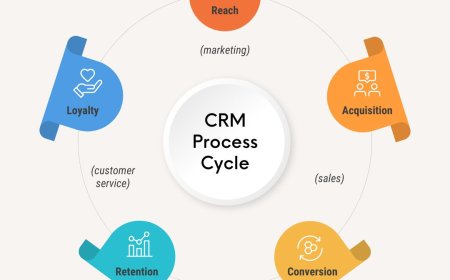How to Choose the Right AI Development Company for Your Business in 2025
Artificial Intelligence (AI) has evolved from a futuristic concept into a practical necessity for businesses in 2025. From automating tasks to making data-driven decisions, AI is now at the core of digital transformation. But with its rapid evolution comes a crucial question: How do you choose the right AI development company for your business?

Artificial Intelligence (AI) has evolved from a futuristic concept into a practical necessity for businesses in 2025. From automating tasks to making data-driven decisions, AI is now at the core of digital transformation. But with its rapid evolution comes a crucial question: How do you choose the right AI development company for your business?
Making the wrong decision could waste resources, delay innovation, or worse, compromise your competitive edge. So, how do you sift through the noise and find a company that understands your vision but has the technical know-how to bring it to life?
This in-depth guide is your roadmap. Well walk you through every essential step, from defining your AI needs to evaluating company portfolios, ensuring that by the end, youre fully equipped to make the smartest investment for your future.
Introduction
AI is no longer a luxury; it's a strategic requirement. Businesses across industriesfrom retail and healthcare to finance and manufacturingare leveraging AI to streamline operations, cut costs, and enhance customer experiences.
In 2025, AI isn't just about automation. It's about intelligence. Whether you're using it for predictive analytics, natural language processing (NLP), robotic process automation (RPA), or recommendation engines, your success heavily depends on who you choose as your AI partner.
And lets be honestAI is complex. Youre not just hiring coders; youre hiring architects of intelligence. Thats why the selection process needs to be thorough, objective, and tailored to your specific needs.
Think of it like hiring a head chef. You dont want someone who only knows recipesyou need someone who understands your guests, designs the menu, and manages the entire kitchen. Thats the level of expertise you need in an AI development company.
Understanding Your AI Needs
Before you even start Googling best AI development companies, stop and look inward. The first step isnt out thereits in here, in your own business.
Define Your Business Goals
Start by answering this: What do you want AI to do for your business?
- Do you want to reduce operational costs?
- Are you looking to enhance customer service with chatbots?
- Are you aiming to generate insights from big data?
- Maybe you're trying to forecast demand or optimize your supply chain?
Each goal demands a different AI approach. You need to be crystal clear on your objectives because that will determine the kind of expertise you need from a vendor.
Write down your goals, even if they seem abstract. Concrete documentation not only aligns your internal teams but also gives potential vendors something to analyze and assess during discovery meetings.
Identify AI Use Cases in Your Industry
AI solutions arent one-size-fits-all. A healthcare provider will use AI differently from a logistics company. This is where research pays off.
Here are some sample industry-specific use cases:
- Retail: Personalized recommendations, inventory management, AI-driven sales forecasting
- Healthcare: Predictive diagnostics, patient monitoring, administrative automation
- Finance: Fraud detection, credit scoring, algorithmic trading
- Manufacturing: Predictive maintenance, quality control, supply chain automation
Knowing these use cases will help you frame your requirements and communicate them effectively. It also ensures the development company understands the context, which makes a huge difference in implementation.
Qualities to Look for in an AI Development Company
Once your goals and use cases are defined, its time to evaluate the companies themselves. Not all AI vendors are created equal, and some are just riding the hype train without any real substance.
So, what should you look for?
Proven Track Record and Case Studies
Any reputable AI development company should be able to show you a portfolio of their work. We're talking real projects, with real clients, and real results.
Dont settle for vague claims. Ask for case studies that:
- Detail the problem and proposed AI solution
- Highlight the technology stack used
- Showcase measurable business impact
If they cant provide case studies or specific success metrics, thats a red flag.
Also, look for third-party reviews, awards, and recognitions. If theyve been featured in reputable publications or conferences, even better.
Expertise in Relevant Technologies
AI is an umbrella term that covers multiple technologies. A good AI development company should be fluent in:
- Machine Learning (ML)
- Natural Language Processing (NLP)
- Computer Vision
- Neural Networks
- Generative AI (like GPTs)
On the tech stack side, they should know how to work with:
- TensorFlow, PyTorch, Keras
- OpenCV, Hugging Face, Scikit-learn
- Cloud platforms like AWS, Azure, or Google Cloud AI tools
Check if their engineers have certifications or backgrounds in data science, ML, and software development. Bonus if theyre actively involved in AI research or have patents/publications.
Customization and Scalability Capabilities
Your AI solution should not just workit should grow with you.
The company should demonstrate an ability to:
- Build custom models tailored to your business logic
- Scale the system across teams, geographies, and data volumes
- Integrate AI with your existing tools and infrastructure
Ask them how they handle version control, deployment pipelines, and updates. AI isnt staticit evolves. So, choose a partner that builds flexible, scalable solutions.
Evaluating Technical Expertise
Even if a company has an impressive website or flashy portfolio, it's the technical depth that makes or breaks an AI project. You need a partner who understands the tech beyond buzzwordsand who can deliver actual working models that solve real problems.
Knowledge of AI Models and Frameworks
A top-tier AI development company should be well-versed in the latest AI frameworks and tools. This isnt just about naming TensorFlow or PyTorchits about knowing when and how to use them effectively.
Ask the team about:
- Model Selection: Do they choose models based on accuracy, performance, and interpretability?
- Training and Tuning: Do they use techniques like cross-validation, hyperparameter tuning, and model ensembling?
- Deployment Practices: Do they use Docker, Kubernetes, or ML Ops tools like MLflow?
A technically solid company should be able to explain, in simple language, how it trains, tests, and deploys models. If they cant, they probably dont understand it well enough themselves.
You should also inquire about their ability to work with both traditional ML models and advanced architectures like:
- Transformer-based models (e.g., BERT, GPT)
- CNNs and RNNs
- Autoencoders and GANs
A technically sound partner doesnt just build modelsthey build robust, explainable, and maintainable models that scale.
Proficiency in Machine Learning, NLP, and Deep Learning
Your chosen AI partner should not only know how to write codethey need to understand the science behind it.
Heres what real expertise looks like:
- Machine Learning: Ability to perform regression, classification, clustering, and recommendation using structured/unstructured data.
- Natural Language Processing (NLP): Skills in sentiment analysis, named entity recognition, text summarization, and chatbots.
- Deep Learning: Experience in building neural networks for speech recognition, image processing, or anomaly detection.
They should also be proficient in data preprocessing, feature engineering, and handling imbalanced datasets. The best companies can explain how they mitigate overfitting, improve generalization, and measure model bias.
Dont forget to ask about real-time AI capabilities, like processing streaming data or enabling real-time inference.
Industry Experience and Niche Specialization
AI isn't just about techits about applying tech to solve industry-specific challenges. A company that deeply understands your business domain will build better models, faster.
Understanding of Your Market and Domain
Imagine hiring a company to build a recommendation engine for your fashion eCommerce store, but theyve only worked in agriculture. Thats a knowledge gap you dont want.
Why does domain expertise matter so much?
- Better data interpretation: They understand what the data points actually mean in your context.
- Faster onboarding: Less time is spent explaining your industry, processes, or metrics.
- Smarter decisions: Their models align better with your KPIs and business goals.
Ask potential vendors about their experience in your field:
- Have they worked with companies like yours before?
- What unique challenges did they solve?
- Do they understand your customer lifecycle or regulatory landscape?
An AI partner who knows your world can offer insights you didnt even know you needed.
Examples of Past Success in Similar Industries
Always ask for tangible examples of past projects within your industry. This is where case studies or detailed portfolios shine.
For example:
- A fintech company might showcase an AI fraud detection model that reduced fraudulent transactions by 40%.
- A healthcare AI firm might demonstrate how its NLP tool improved medical record accuracy and saved time for physicians.
- A logistics client may present results from a route optimization engine that cuts delivery times by 20%.
These arent just bragging rightstheyre proof that the company knows how to apply AI to your business challenges.
Don't forget to check:
- Did their solution go live or just stay in the prototype phase?
- What was the ROI or cost savings?
- Were there any bottlenecks, and how were they addressed?
Project Management and Communication Skills
Great tech alone doesnt make a successful project. Communication, collaboration, and clarity are just as crucial. You want a partner who works like an extension of your team, not a black-box contractor.
Agile Methodologies and Team Collaboration
In AI development, flexibility is key. Requirements can change. Data can evolve. Thats why the best companies follow Agile or similar iterative frameworks.
Look for teams that:
- Work in sprints and provide regular updates
- Involve your stakeholders in planning and reviews
- Are open to changing direction based on new insights
Its also important to know how they structure their team:
- Do they assign a dedicated project manager?
- Is there a scrum master or technical lead?
- Who is responsible for documentation and delivery?
A collaborative team reduces misunderstandings, keeps you in the loop, and adapts quickly when things change.
Transparent Reporting and Feedback Mechanisms
You shouldnt have to chase your vendor for updates. A good company offers visibility at every stage of the project.
Ask them:
- How often will they report progress?
- What tools do they use for project tracking (e.g., Jira, Trello, Asana)?
- Do they provide dashboards or data visualization for model performance?
Also, evaluate how open they are to feedback. Can you request revisions? How do they handle change requests or pivot points?
Good AI partners dont just deliverthey co-create with you, every step of the way.
Budgeting and Pricing Models
Hiring an AI development company isnt cheap, but it shouldnt break the bank either. Pricing can vary wildly depending on the project's scope, the team's expertise, and the tech stack involved. What's important is understanding what you're really paying forand making sure it's worth it.
Understand the Cost vs Value Ratio
AI development can be expensive upfront, but it should deliver long-term value. Thats why its crucial to look beyond the hourly rate or project cost and consider the return on investment (ROI).
Heres how to think about cost vs value:
- A cheaper company may deliver a generic solution that doesnt scale or fit well with your business processes.
- A more expensive company might build a custom, scalable system that saves you money and time down the road.
Look at the bigger picture:
- Will the AI reduce manual labor?
- Will it improve customer satisfaction or conversion rates?
- How soon will it start paying off?
Also, ask about whats included in the cost:
- Data collection and cleaning?
- Model training and tuning?
- Integration with your current systems?
- Post-deployment monitoring and support?
A transparent vendor will break this down for you, helping you see what you're actually getting for every dollar spent.
Types of Engagement Models
Different companies offer different engagement models depending on your needs. Here's a quick breakdown:
- Fixed Price: Best for small, well-defined projects. You agree on the scope, timeline, and cost upfront. Great for POCs and MVPs.
- Time and Material (T&M): You pay for hours worked. This is ideal for evolving projects with shifting requirements or research-heavy phases.
- Dedicated Team: You hire an AI team that works exclusively on your project. Best for long-term partnerships or complex systems that require continuous updates.
Choose an engagement model that aligns with your business style, risk appetite, and the nature of your project.
Bonus tip: Ask if the company offers flexible billing options or scalable team sizes as the project grows.
Security, Compliance, and Ethical AI
In a world driven by data, security and ethics are no longer optionaltheyre essential. AI systems, if not handled properly, can create serious vulnerabilities and even reputational risks.
Data Privacy Measures
Your AI vendor will likely need access to sensitive business data. That means they must have strong data protection policies in place.
Ask about:
- Data encryption (in transit and at rest)
- Anonymization or pseudonymization
- Access controls and authentication protocols
- Secure cloud infrastructure
If youre dealing with regulated data (e.g., financial, medical, or user personal information), ensure the vendor is compliant with frameworks like:
- GDPR (Europe)
- CCPA (California)
- HIPAA (USA, for healthcare)
Request documentation that proves their compliance and data governance protocols. Better safe than sorry.
Adherence to Legal and Ethical Standards
Beyond compliance, you want your AI partner to build systems responsibly. Ethical AI isnt just a trendits a necessity in 2025.
Some questions to ask:
- Do they perform bias audits on their models?
- How do they handle explainability and transparency?
- Can they help ensure fairness and non-discrimination in model outcomes?
Responsible AI development should be embedded in their workflow, from data selection to final deployment. Companies that take these factors seriously will help you avoid future PR disasters and legal troubles.
Post-Development Support and Maintenance
Building an AI solution isnt a one-and-done deal. AI systems evolve, models degrade, and business needs change. Thats why post-launch support is just as important as development.
SLA (Service Level Agreements)
A well-structured SLA defines:
- Response times for bug fixes
- Uptime and performance guarantees
- Support hours and availability
- Incident escalation procedures
Without an SLA, you risk delays, downtime, or hidden support fees.
Make sure the agreement includes:
- Regular performance reviews
- Scheduled maintenance and model retraining
- Access to dashboards and logs for transparency
An SLA is your safety net. Treat it as seriously as you would a contract with a utility provider or insurance company.
Ongoing Support and Model Upgrades
AI models degrade over timea concept known as model drift. Data patterns shift, user behaviors evolve, and suddenly your 95% accurate model is underperforming.
Thats why continuous support is crucial:
- Model Monitoring: Keep track of performance metrics.
- Retraining: Periodically update the model with fresh data.
- System Updates: Patch dependencies and security vulnerabilities.
- Tech Advancements: Integrate newer, more efficient algorithms or architectures.
Ask how often they revisit deployed systems and whats included in their maintenance packages. You want a partner who wont ghost you once the contract is signed.
Checking References and Reviews
A slick website and smooth sales pitch only tell part of the story. Real-world reviews and client references can provide insights that no brochure or sales deck ever will.
Client Testimonials
Testimonials, especially those with named clients and specific outcomes, are gold. They show that others have trusted this company and gotten results.
Look for:
- Names and logos of previous clients
- Quotes about the teams responsiveness, technical skill, and flexibility
- Before-and-after metrics (e.g., Increased prediction accuracy by 20%)
Even better: ask to speak directly with one of their past clients. A good company will gladly connect you with references who can vouch for their work.
Online Ratings and Third-Party Reviews
Dont forget the power of independent reviews. Sites like:
- Clutch.co
- GoodFirms
- G2
- TrustRadius
These platforms often include detailed feedback, pricing transparency, and ratings across categories like quality, communication, and timeliness.
Beware of red flags:
- Lots of reviews were posted on the same date
- Generic praise without specifics
- A history of disputes or non-delivery claims
A pattern of glowing, in-depth reviews from multiple clients? Thats a green light.
Importance of Innovation and R&D
If youre betting your business on AI, dont settle for a company thats stuck in yesterdays methods. AI is advancing fast, so your development partner should be riding that wave of innovation, not trailing behind it.
R&D Investment
A strong AI company is constantly learning, testing, and improving. How can you tell? Ask them about their R&D efforts.
- Do they have an in-house innovation lab?
- Are they experimenting with cutting-edge technologies like generative AI, federated learning, or edge AI?
- Do they publish research papers, contribute to open-source, or attend major AI conferences?
These are signs that the company is committed to staying ahead of the curveand bringing the best to your business.
Why does this matter to you? Because what works today might be outdated tomorrow. A partner who invests in R&D ensures your AI systems wont become obsolete in a year. Theyll also help you pivot quickly as trends change or new opportunities emerge.
Future-Proofing Your Business with AI
Its not just about building something that works nowits about building something that will still work (and thrive) in the future.
A forward-thinking AI company will:
- Design systems that can scale with your growth
- Use modular, flexible architectures
- Offer insights into emerging trends that could benefit your strategy
Ask questions like:
- What innovations are you currently exploring?
- How do you ensure that your AI systems remain future-ready?
- What upcoming technologies should we keep an eye on?
An AI company that proactively brings you new ideas is worth its weight in gold.
Comparing Shortlisted Companies
Youve probably got a list of 35 companies youre interested in. Now its time to put them to the testobjectively.
Conduct Interviews and Demos
Now take things a step furthermeet them. Interviews and demos give you firsthand experience with the team youll potentially be working with.
During these sessions:
- Ask technical questions (or bring in your CTO to do so)
- Observe how they communicateare they clear and confident or vague and dodgy?
- Request a demo or walk-through of a recent project.
Youll quickly get a feel for whos legit, whos enthusiastic, and who actually understands what your business needs.
Red Flags to Avoid
While some companies stand out for all the right reasons, others might be waving some serious red flags. Ignore these at your own risk.
Overpromising Results
If a company promises 100% accuracy or instant ROI, run. AI is powerful, but its not magic. Any seasoned professional knows that:
- Accuracy depends on the data quality
- ROI takes time and alignment with the business model
- There will be iteration, trial and error, and constant tuning
Look for realistic timelines, detailed roadmaps, and honest answers. A company thats transparent about limitations is usually more trustworthy.
Lack of Transparency
Transparency is everything. If a company is unwilling to:
- Share their methodology
- Provide regular updates
- Disclose data usage
- Let you meet their actual developers or project managers
its probably because theyre hiding something.
Steer clear of black-box vendors who dont offer full visibility into the AI development process. The best companies want you involvedthey see you as a partner, not just a client.
Making the Final Decision
After all the calls, meetings, comparisons, and gut checks, youve probably narrowed it down to one or two strong contenders. So, how do you make the final call?
Team Compatibility
Youre not just hiring a vendoryoure hiring collaborators. People who will work alongside your team for months (or even years).
Ask yourself:
- Do they listen and ask smart questions?
- Do they communicate clearly and proactively?
- Do they show genuine interest in your business goals?
Sometimes, the best company on paper isnt the best fit culturally. Choose the one that gets your vision and fits well with your teams work style.
Legal Contracts and Deliverables
Now the paperwork begins. Review all contracts carefullypreferably with legal counsel.
Make sure you clarify:
- IP ownership (you should own whats built)
- Timelines and payment terms
- Milestone deliverables
- Termination clauses
Also define deliverables like:
- Source code and documentation
- Trained models and datasets
- User manuals and training sessions
- Support timelines and upgrade terms
Leave no room for misunderstandingclear contracts make for smooth collaborations.
Conclusion
Choosing the best AI development company in 2025 is no small taskbut its one of the most important investments youll make this decade. Its about more than just codeits about choosing a partner who understands your vision, aligns with your values, and has the technical and strategic muscle to turn ideas into impact.
So take your time. Ask the hard questions. Demand transparency, technical depth, and real-world experience. The right partner wont just build a producttheyll build a future for your business.
H2: FAQs
1. Whats the typical timeline for an AI project?
It varies, but most AI projects take between 3 and 9 months, depending on complexity, data availability, and integration needs.
2. How do I validate the expertise of an AI development company?
Look for case studies, certifications, client testimonials, technical interviews, and public contributions to open-source or research.
3. Should I choose a local or offshore AI vendor?
It depends on your budget and communication needs. Offshore companies may be cheaper, but local teams often offer closer collaboration and timezone alignment.
4. Can startups afford AI development in 2025?
Yes, many AI vendors offer MVPs or modular solutions tailored for startups. Cloud-based AI tools have also lowered entry barriers significantly.
5. How can I ensure ROI from AI implementation?
Start with a clearly defined problem, use high-quality data, measure performance against KPIs, and work with a vendor who focuses on business value, not just tech.









































